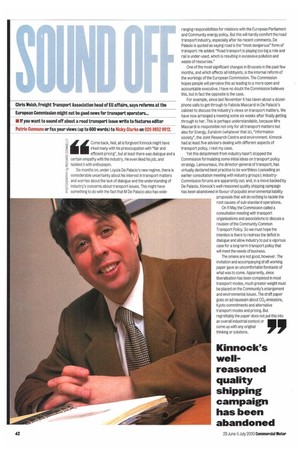ranging responsibilities for relations with the European Parliament and Community
Page 44

If you've noticed an error in this article please click here to report it so we can fix it.
energy policy. But this will hardly comfort the road transport industry, especially after his recent comments. De Palacio is quoted as saying road is the "most dangerous" form of transport. He added: "Road transport is playing too big a role and rail is under-used, which is resulting in excessive pollution and waste of resources."
One of the most significant changes in Brussels in the past few months, and which affects all lobbyists, is the internal reform of the workings of the European Commission. The Commission hopes people will perceive this as leading to a more open and accountable executive. I have no doubt the Commission believes this, but in fact the opposite is the case.
For example, since last November it has taken about a dozen phone calls to get through to Fabiola Maseardi in De Palacio's cabinet to discuss the industry's views on transport matters. We have now arranged a meeting some six weeks after finally getting through to her. This is perhaps understandable, because Mrs Maseardi is responsible not only for all transport matters but also for Energy, Euratom (whatever that is), "information society", the Joint Research Centre and environment. Kinnock had at least five advisers dealing with different aspects of transport policy. I rest my ease.
Yet this detachment from industry hasn't stopped the Commission formulating some initial ideas on transport policy strategy. Lamoureaux, the director-general of transport, has virtually declared best practice to be worthless (cancelling an earlier consultation meeting with industry groups); industryCommission forums are apparently out; and, in a move backed by De Palacio, Kinnock's well-reasoned quality shipping campaign has been abandoned in favour of populist environmental liability proposals that will do nothing to tackle the root causes of sub-standard operations.
On11 May the Commission called a consultation meeting with transport organisations and associations to discuss a revision of the Community Common Transport Policy. So we must hope the intention is there to redress the deficit in dialogue and allow industry to put a vigorous case for a long-term transport policy that will meet the needs of business.
The omens are not good, however. The invitation and accompanying draft working paper gave an uncomfortable foretaste of what was to come. Apparently, since liberalisation has been completed in most transport modes, much greater weight must be placed on the Community's enlargement and environmental issues. The draft paper goes on ad nauseam about CO2 emissions, Kyoto commitments and alternative transport modes and pricing. But regrettably the paper does not put this into an overall industrial context or come up with any original
thinking or solutions.












































































































